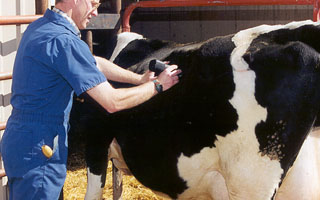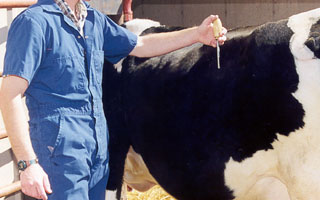
| Clip an area high on the left flank over the most distended point. |
allergic reaction | bleeding (severe) | bloat | calves born not breathing
- EPINEPHRINE (1:1000) given at a dose of 1 mL per 100 lbs. of body weight, IM. If symptoms continue to get worse, this dose can be repeated one hour after the first dose.
- In severe cases, epinephrine can be given IV using one quarter of the above dose. If given IV, administer slowly.
- ANTI-INFLAMMATORY - Choose ONE of the following: Banamine, Dexamethasone, Predef or lastly Re-Covr. These are given IM at the recommended doses as long as symptoms persist. (See the anti-inflammatory section of the manual.)
- Applying direct pressure using clean towels, bandage material, and some tape or wrap. These dressings, once soaked with blood, should not be removed but should be left on, and additional layers placed over them.
- Keeping the animal calm and confined.
- If bleeding on a limb is extremely severe, a tourniquet may be applied above the injury. Caution should be taken to ensure that the tourniquet is not left on for long periods of time.
- If a milk vein is cut, a pair of needle-nose vice grips or hemostats can be placed on the milk vein
- Contact a veterinarian immediately.
- An area on the left flank should be clipped and prepared.
- Depending on availability, a trocar, a large diameter needle or, as a last resort, a sterilized knife can be inserted through the skin and into the rumen. Hold in place until the gas pressure is relieved. Diluted Therabloat (page J810) or 30 mL of liquid dish washing detergent can be injected directly into the rumen.
- Realize that any contamination can result in abdominal infections.
- After emergency treatment has been performed, call a veterinarian.
(See bloat treatment on page F70 and figures 1 and 2)

|
Figure 1
|

|
Figure 2
|
To stimulate respirations:
- Place a piece of straw or hay into a nostril, vigorously bringing it in and out. Rub the roof of the calf’s mouth with a finger.
- Rub the body briskly.
- Inject 1-2 mL of Dopram intravenously or under the base of the tongue in an area with a lot of vessels.
- Utilize an "artificial resuscitator" or hold the mouth closed and blow into one nostril, while blocking off the other.
- It is NOT recommended to swing the animal in the air or hang them upside down. Swinging actually makes it harder for the calf to breathe.